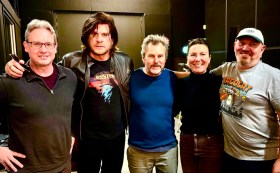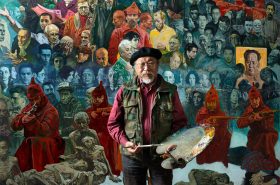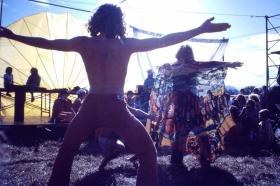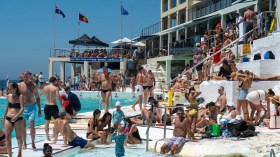In a better world, I would accept that something deep in my soul recoils from reality TV, and so I simply would never watch Byron Baes, let alone write about it.
Unfortunately we live in a bad, Extremely Online world where I am a screen critic, hate-watching brings the clicks, and so I have been commissioned to write about Byron Baes.
Duly, I hate it. I felt assailed by an intense, almost physical repulsion for its unpleasant cast and their phoney interactions. Dismay swamped me at the thought that these people were real, and that other real people actually follow them on social media.
The only thing that provided me any mental refuge was imagining that the Byron Baes cast were deliberately performing stock character roles. I tried to think of them, deep down, as fellow human beings driven by their own unique wants, needing no prompting by producers.
This thought experiment was hard. I found myself cherishing the brief microexpressions that crossed their laminated faces as they appeared to react spontaneously. Then I would feel disappointed when another exposition-laden line of dialogue dropped like the sawn-off end of a plank.
Semi-scripted docudrama is deeply uncanny. It lacks the behind-the-scenes authenticity of observational documentary, and it feels flaccid and pointless without the competitive structure of other reality-TV formats. I hated the show’s suffocatingly hermetic quality, as if no ordinary people live here – nor even any other influencers. When these fools throw an event, the same eight people show up every time. And the storylines have such low stakes that they never build a sense of narrative momentum.
I was briefly diverted by the way that some participants were plucked from previous reality shows, and are clearly still operating within the paradigms that groomed them. Bulky Nathan Favro has tried his hand at The Bachelorette and Bachelor in Paradise, while Elias Chigros is a Love Island alumnus. Byron Bay is established as a gossipy small town with a limited dating pool yet, implausibly, both men are down to nest.
Read: More Than This is sleek and sunny
I was briefly diverted by the way their wooing styles clash at cross-purposes as they compete to be warily humoured by Sarah, but metatextually I knew not to bother caring. Relationships from dating shows don’t last and aren’t real. And we know that Nathan’s woodchips will eventually be swept up – perhaps by his occasional hookup Hannah Brauer, who runs a repository of pale linen textiles with her mum; or by his ‘housemate’, woo-woo girlboss Elle Watson.
What actually was the point of this? To roast reality TV formats and the kinds of people who derive a sense of purpose from them? Executive producer Emma Lamb (Married at First Sight Australia, The Real Housewives of Sydney) has plenty of experience moulding characters to cheer and boo, but I hated the heavy determinism of the Byron Baes characters.
Brain cells dying
The most normal person, and hence the audience avatar, is Sarah St James, an aspiring musician from the Gold Coast who inexplicably decides Byron Bay is where stars are born. (I guess Tones and I busked in Byron …) An innocent abroad, she errs by seeking the guidance of talent agent Alex Reid, who at least bought some dignity by serving up mean little comments about the other cast members.
Sara’s arrival in town has more dignity and humility than that of Jade Kevin Foster, a relentlessly cheerful, needy void. Like Sarah, he’s from the Gold Coast – a cursed place that seems to disturb the Byron-born Baes. (It’s like how New Yorkers speak of Long Island, or Stephen King speaks of Derry, Maine.)
Jade is presented as fundamentally phoney because he’s happy to call himself an influencer and do the aggressive networking that this requires. Perhaps the Byron Bay influencers who hated the very idea of this show were right, because the business of being an influencer is depicted here as intensely vapid.
I felt my brain cells dying in real time as Hannah’s mum photographs her in the golden hour, rhapsodising that ‘the way you move your body is really good’ and Hannah’s like, ‘oh, I don’t even know what I was doing’. Number one, you absolutely do know what you were doing; number two, even though this is clearly material labour under technocratic late capitalism, it’s immorally inconsequential.
Read: TV Review: Troppo
The most interesting character to me was Cai – a tattoo artist/photographer goblin who dresses in black rags – because he felt like a relic of the old Byron Bay: the weird hippie town where children grow up semi-feral and end up living in hinterland cabins tattooing chunks of pigskin.
As I watched, I kept thinking how much more lively and satirical this premise could have been as a scripted series along the lines of The White Lotus. But the affordances of these formats themselves can’t quite support commentary. I guess that’s why we’ve developed a whole media ecosystem of sassy recaps and elevated academic discourse about reality TV to generate the emotional and intellectual enjoyment that the shows themselves can’t deliver.
Psychic pain
I hate the idea that this show is being celebrated for confected moments that some viewers will fondly remember and bond over, but which cause me a kind of psychic pain to recall: Elle making a ‘ceremonial cacao’ drink, or Jade and Hannah sitting in a crystal geode cave musing about ‘dragon bones’.
I don’t know what I was expecting from a show like this. Because I haven’t been groomed by reality TV, and I don’t find it pleasurable in any way, that Byron Baes used the tropes of drama and not the tropes of documentary – and did it so limply – instantly put me offside. I felt angry at the producers, as though they hadn’t been willing to hang around and capture ridiculous moment that came up spontaneously, or moments of conflict that felt like they’ve been brewing for awhile, and instead felt they had to confect them.
I felt like I was watching an incompetent primary-school production of the scripted satirical drama that this could have been. Indeed, one scene, in which the cast are pretending to meditate during a “sound healing” performance at a party, but can’t help peeking and guffawing at each other, reminded me intensely of children acting up in class. I hated being put into the killjoy subject position of ‘grade three teacher’. I hated this show so much.
Byron Baes is currently streaming on Netflix.





